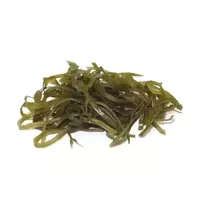Seaweed (laminaria)

Sugar kelp is a brown seaweed that belongs to a genus called "Laminaria. " It is also known as sea cabbage. Its second and most used name is due to the external similarity with the shredded leaves of ordinary cabbage, which have been heat treated. In addition to gastronomic value, the beneficial properties of sea cabbage (kelp) are known to many peoples who have been eating this product for many millennia.
It is curious that in cooking you can use sea cabbage (kelp) in any form: dried, frozen, fresh or cured. In addition, sea cabbage is well marinated and preserved, and then used as one of the ingredients in the preparation of tasty and healthy salads, in which mushrooms, vegetables, meat or fish can also be added. By the way, sea cabbage (kelp) is stewed with meat, excellent soup and even jam are cooked from it. Australians and Englishmen can even boast of the special bread they bake using these seaweed. Interestingly, sea cabbage (kelp) has found its application in marmalade and jelly, in marshmallows and even caramel. And the Americans invented a completely unusual method of cooking - they thought of sugaring sea cabbage (kelp).
Benefits of sea cabbage
As for the benefits of sea cabbage (kelp), it is primarily appreciated as a natural source of iodine, which in this algae contains up to 3 percent of the mass of the product. Thanks to this useful property of sea cabbage (kelp), it is often advised to include in the diet people suffering from thyroid hyperplasia (goiter).
This priceless gift of the sea contains phytosterols in excess, which help the body clear cholesterol, thereby ensuring the prevention of atherosclerosis. Regular consumption of sea cabbage (kelp) has a beneficial effect on the state of the blood, reduces the risk of strokes, heart attacks, angina, and also has the ability to normalize the menstrual cycle in women. It is not for nothing that there are very few people suffering from atherosclerosis among the Japanese who actively eat sea cabbage (kelp).
The benefits of sea cabbage (kelp) are also known as a dietary product. Due to the fact that the calorie content of sea cabbage (kelp) is only 2
4. 9 kcal per 100 grams of algae, it serves as an excellent basis for preparing many healthy dishes that people who adhere to various diets can easily afford.
Damage to sea cabbage
In addition to the beneficial properties of sea cabbage (kelp), you can sometimes encounter undesirable consequences, since there are a number of contraindications to its use. Thus, doctors prohibit the use of these algae as food in the presence of hemorrhoids, tuberculosis, nephrosis, acne, chronic rhinitis, furunculosis and urticaria.
In order to avoid possible harm to sea cabbage (kelp), it is recommended to buy not ready-made dishes, but algae fresh or dried, due to the fact that industrial salads contain a lot of not particularly useful additives.
And also: before getting acquainted with sea cabbage (kelp) for the first time, consult a specialist for the absence or presence of personal intolerance.
sea cabbage (kelp) 24.9 kCal
Energy value of sea cabbage (kelp) (Ratio of proteins, fats, carbohydrates - ju):
Proteins: 0.9 g (~ 4 kCal)
Fats: 0.2 g (~ 2 kCal)
Carbohydrates: 3g (~ 12kCal)
Energy ratio (bj | y): 14% | 7% | 48%
 Español
Español Français
Français Português
Português Русский
Русский 简体中文
简体中文 繁體中文
繁體中文 日本語
日本語 한국어
한국어 العربية
العربية Türkçe
Türkçe Қазақ
Қазақ Deutsch
Deutsch Italiano
Italiano Українська
Українська
